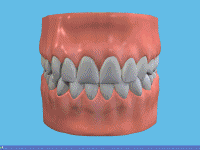 Tooth whitening is an effective way of “lifting” the shade of your teeth using solutions that remove staining from the surface. Custom-made trays are created for each dental arch, which you wear overnight with whitening gel inside them. Usually within a week you can notice a difference, but two weeks is usually sufficient for most requirements.
Tooth whitening is an effective way of “lifting” the shade of your teeth using solutions that remove staining from the surface. Custom-made trays are created for each dental arch, which you wear overnight with whitening gel inside them. Usually within a week you can notice a difference, but two weeks is usually sufficient for most requirements.
While this is harmless, it is recommended that the teeth are not whitened again for 12-18 months, when some slight drift back of shade may have occurred.
Please note
Due to recent legal developments, people who are not working under the supervision of a dentist are being taken to court for providing tooth whitening treatments.
FAQs about Tooth whitening
What does tooth whitening do?
Tooth whitening can be a highly effective, yet very simple way, of lightening the colour of teeth without removing any of the tooth surface. It does not change the shade of the teeth, but lightens the existing colour.
What does the procedure involve?
The patient applies the whitening product using a specially made tray which fits into the mouth like a gum shield. The active ingredient in the product is normally hydrogen peroxide or carbamide peroxide.
The procedure needs to be repeated for 2 weeks or until the right shade is reached.
How long does the procedure take?
First of all you will need 2 or 3 visits to your dentist. Your dentist will need to make a thin mouthguard called a WhiteningTray and will need to take impressions for this at the first appointment. Once your dentist has constructed the WhiteningTray, they will fit the trays and go through the first stage of treatment with you. You will then continue the treatment at home over the subsequent weeks.
This will mean applying the bleach regularly for at least 2 hours at a time. After a week, usually a change is obvious – most people prefer the result they get after 2 weeks. The results will vary from individual to individual.
Why would my teeth need to be whitened?
Everyone is different; and just as our hair and skin colour varies, so do our teeth. Some teeth have a yellowish tinge, some are more beige – very few are actually ‘white’. Teeth also yellow with age and can become stained on the surface by food and drinks such as tea, coffee and blackcurrant. Calculus (tartar) can also affect the colour of the teeth. This will come off with deep tooth cleaning by your dentist.
Some people however, may have staining inside their teeth. This is usually due to the tooth nerve laying down extra dentine on the inside of the pulp chamber – which is darker in colour.
Will I be happy with the results?
Treatment results may vary depending on the original shade of the teeth. Teeth will tend to darken slightly over time. The effect lasts for around 1 to 3 years, providing you avoid foods and drinks that cause staining to build up, for example, coffee and red wine. Smoking will also increase the likelihood of staining on your teeth. Some people find that their teeth are sensitive for the first few days after treatment, but this wears off after a short while.
What about home kits?
Over-the-counter kits are not recommended as they contain only a small amount of hydrogen peroxide which makes the product less effective. Some also contain mild acids, while others are abrasive – both of which may permanently damage teeth. Although these products are cheaper, whitening is a complicated treatment procedure and should only be carried out by a dentist after a thorough examination and assessment of your teeth.
It is very important to follow the instructions your dentist gives you, and to make sure that you go for any follow-up appointments recommended.
When might whitening not work?
Whitening can only lighten your existing tooth colour. For a change to specific chosen shade veneering is another option. Whitening only works on natural teeth. It will not work on any type of ‘false’ teeth. This includes dentures, crowns and veneers. If dentures are stained or discoloured, it may be worth visiting the dentist and asking him or her for advise on how to clean them. Stained veneers, crowns and dentures may need replacing. Again, ask your dentist.
What about whitening toothpaste?
There are now several whitening toothpastes you can buy. Although they do not affect the natural colour of the tooth, they can be effective at removing external staining and therefore improving the overall appearance of the tooth. NB. Routine use of an abrasive ‘tooth whitening’ toothpaste would be like using a smokers toothpaste every day – these are highly abrasive for removing stain and may cause tooth damage and sensitivity if used regularly.






